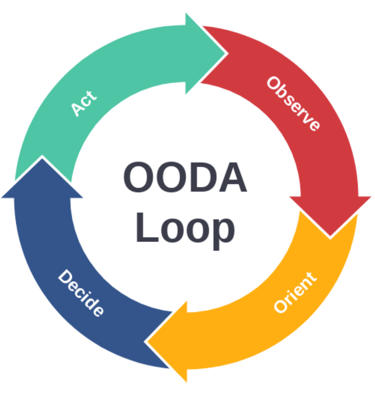The OODA Loop Mindset
The OODA Loop is a decision-making and problem-solving framework that involves four stages: Observe, Orient, Decide, Act.
The OODA Loop, conceived by military strategist and fighter pilot John Boyd, is a decision-making and problem-solving framework that involves four stages: Observe, Orient, Decide, Act. It's not merely a linear process but a continuous loop where each step informs the next, aiming for faster and more effective decision-making in dynamic situations.
Here's a detailed breakdown of the OODA Loop:
Observe: This step involves actively gathering information from the environment, assessing the situation without biases, and comprehensively understanding the variables at play. It includes sensing changes, recognizing patterns, and staying aware of shifts in the context.
Orient: It's about making sense of the observed information by analysing it through the lens of past experiences, knowledge, culture, and mental models. This step is critical as it shapes the understanding and interpretation of the observed data, helping in forming a relevant mental framework.
Decide: After processing and understanding the information, the next step is making a decision or forming a course of action. This decision should be agile, adaptive, and aligned with the observed reality and the current situation.
Act: Implementing the decided course of action. It involves executing the plan effectively and efficiently. However, this step isn’t the endpoint; it feeds back into the observation stage, as the consequences of the action will provide new information that informs further iterations of the loop.
Boyd's concept extends beyond its military origins and has applications in various fields, including business, law enforcement, and problem-solving. It underscores the importance of agility and adaptability in responding to changing circumstances. The loop isn't a linear process but rather a continuous cycle where each stage influences the others. Successful execution of the OODA Loop requires agility, flexibility, and the ability to iterate quickly based on new information.
This approach enables individuals or organisations to gain a competitive advantage by outmanoeuvring opponents or swiftly adapting to dynamic situations.
Adopting the OODA Loop mindset involves constantly iterating through these stages, leveraging information to make quicker, more informed decisions, and staying ahead of competitors or adversaries by staying responsive to changing conditions.
The OODA Loop mindset emphasises agility, adaptability, and the ability to iterate rapidly based on changing circumstances. It's widely applied beyond military contexts, being utilised in business strategy, competitive intelligence, crisis management, and innovation processes. This approach fosters flexibility and resilience in decision-making by promoting a continuous feedback loop that accounts for emerging information and changes in the environment.


